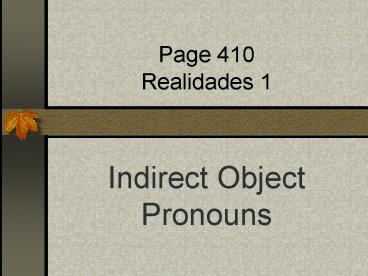Page 410 Realidades 1 - PowerPoint PPT Presentation
1 / 16
Title:
Page 410 Realidades 1
Description:
... etc. For example: Indirect Object Pronouns A ella le gustan las faldas? S , le fascinan! A ellos les encanta la comida? S , les encanta! – PowerPoint PPT presentation
Number of Views:76
Avg rating:3.0/5.0
Title: Page 410 Realidades 1
1
Page 410Realidades 1
- Indirect Object Pronouns
2
Indirect Objects
- I bought that skirt for her.
- I gave those shoes to him.
- What is the subject, the verb, the direct object
and the indirect object?
3
Indirect Objects
- I bought that skirt for her.
direct object
verb
indirect object
subject
4
Indirect Objects
- I gave those shoes to him.
verb
direct object
indirect object
subject
5
Indirect Object Pronouns
- Indirect object pronouns tell to whom the action
is being done.
6
Indirect Object Pronouns
- They mean the same thing in English as do the
direct object pronouns, only they add the words
to or for. For example, to you, for me, etc.
7
Indirect Object Pronouns (English)
- (to or for) me
- (to or for) you
- (to or for) him, her, it
- (to or for) us
- (to or for) them
8
Indirect Object Pronouns (Spanish)
- me (to or for me)
- te (to or for you)
- le (to or for him, her, it)
- nos (to or for us)
- os (to or for you all)
- les (to or for them, you all)
9
Placement of Indirect Object Pronouns
- Indirect Object Pronouns, me, te, le, nos, os,
and les are placed either before a conjugated
verb or attached to the end of an infinitive.
10
Before the Conjugated Verb
- Le va a dar el libro a Elena?
- Nos vio hace cinco días a nosotros.
11
Before the Conjugated Verb
- A él, le gustan los libros?
- Sí, le interesan mucho.
12
Before the verb or after the infinitive
- Before the verb
- Le vas a dar el libro a Elena?
- Sí, le voy a dar el libro a Elena.
- After the infinitive
- Vas a darle el libro a Elena?
- Sí, voy a darle el libro a Elena.
13
Indirect Object Pronouns
- These are the me, te, le, nos and les that you
see before gustar, interesar, faltar, fascinar,
etc. - For example
14
Indirect Object Pronouns
- A ella le gustan las faldas?
- Sí, le fascinan!
- A ellos les encanta la comida?
- Sí, les encanta!
15
Indirect Object Pronouns
- Sometimes we use a a pronoun or a persons
name for emphasis or to make it clear who we are
referring to.
16
Indirect Object Pronouns
- Me duelen los pies. Y a ti, qué te duele?
- A Pablo le duelen los pies.
- A Ud. le duelen los pies, no?































